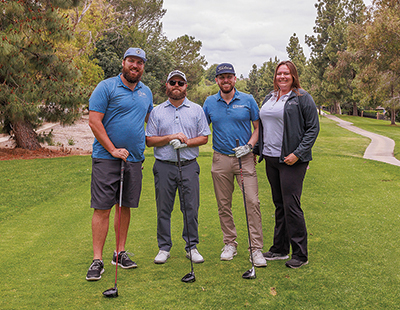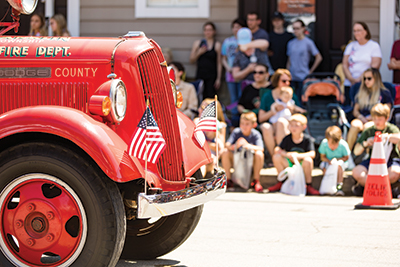For many retailers, marketing can be a challenge and therefore easily avoided. Common reasons to avoid even thinking about marketing may include limited time and money, a lack of understanding of social media or other distribution channels, or even difficulty targeting the right audience.
Community Marketing to Grow Your Business
Crystal Evans of Conejo Awards shares her tips for marketing through local events and organizations.
By: Katy Ibsen
(Originally printed in the March/April 2024 issue of Insights.)
For many retailers, marketing can be a challenge and therefore easily avoided. Common reasons to avoid even thinking about marketing may include limited time and money, a lack of understanding of social media or other distribution channels, or even difficulty targeting the right audience.
However, marketing can boost business, help retain existing customers and acquire new ones, and increase visibility and awareness within the community.

Crystal Evans (far right), president of Conejo Awards in Thousand Oaks, California, values the opportunity to sponsor golf tournaments for exposure on the course and during the awards ceremony.
Photo courtesy of Conejo Awards
Crystal Evans, president of Conejo Awards in Thousand Oaks, California, says a key benefit of marketing in your community is building brand recognition.
“The repeat exposure to your logo and to your name starts to stick in people’s minds,” she says.
Evans, who took over Conejo Awards in 2018, has become an unofficial expert in community marketing through her involvement on local nonprofit boards, by engaging with the Chamber of Commerce, and in her role as a Rotarian. Knowing that not all retail business owners are as engaged with their community, she says there’s still an opportunity to leverage local events and networking with your business for increased exposure.
“My favorite opportunity is the golf tournaments, because I’m not a good golfer, but I’m really good at getting the drinks and driving the golf cart around and talking to people,” she says. “But also, any of the kid-related nonprofits that we support.”
Your time is valuable
Before a business owner even begins thinking about marketing opportunities, Evans suggests first considering who should lead the effort.
“Identify if you are the right person for [the marketing] role,” says Evans. “Or is there somebody else in your organization that is better suited? Maybe you have a front office salesperson, or one of your customer service reps is more of the outgoing person and likes to talk to people, likes to go to events.”
If the right person isn’t already working at the business, consider creating a new role, hiring an intern, or building the opportunity into someone’s duties. Evans recognizes many businesses may be operational with only one or two people, in which case it can be best to start small with a volunteer event.

“Maybe it’s just five or six people that you’re interacting with and doing something good,” she says. “That can help promote you and your business without the shock of having to talk to thousands of people when you’re not so comfortable with that kind of thing.”
Who is your customer?
It’s also important to consider whether you are trying to reach business-to-business (area businesses or corporations) or business-to-consumer customers (local individuals or organizations).
If it’s business-to-business, are there specific industries in your community that you want to break into? If it’s business-to-consumer, are there certain organizations you want to work with or local individuals who may require your services?
Once you identify the customer, research their community involvement to find events and other outreach opportunities. That helps you reach your customer where they are.
How to get involved
Evans promotes a simple formula for those thinking about or getting started in community marketing.
- Identify community marketing opportunities.
- Identify the ways to market at these events.
- Collect data about potential customers and referrals.
Identify community marketing opportunities
Business owners can easily find community events through events calendars and word of mouth, but Evans recommends reaching out to the Chamber of Commerce, city leadership, and business development departments.
“There are typically business development departments in each city, and their goal is to make sure that your business succeeds,” she says. “They may not have anything specific to offer, but they can point you in the right direction.”
 Common community events can include street fairs, craft shows, farmer’s markets, music festivals, beer and wine tastings, car shows, carnivals, youth sports leagues, local theater, and wedding expos.
Common community events can include street fairs, craft shows, farmer’s markets, music festivals, beer and wine tastings, car shows, carnivals, youth sports leagues, local theater, and wedding expos.
“I sponsor a golf tournament, and I’ve got my sign on hole seven, and all the golfers participating are seeing my logo,” says Evans. “Then when it comes to the award ceremonies, the nonprofit gives a shoutout to thank Conejo Awards for providing the awards through their sponsorship. It starts to make the connection, and it’s more about the repeat exposure to your logo and to your name.”

Evans with a local troop of Girl Scouts of California Central Coast after Conejo Awards' corporate cookie buyout.
Photo courtesy of Conejo Awards
The Chamber of Commerce is not only a great resource for getting involved in the community, it also provides networking opportunities. Evans explains that often, with or without a chamber membership, you or an employee can attend a networking event for free or a low entry fee and market your business by connecting with attendees. “It’s an hour and a half of being able to market your business to other local businesses in the area,” she says. “You get out of networking what you put in.”
Common Chamber of Commerce events include networking breakfasts, mixers, economic forecasts events, ribbon cuttings, as well as city, county, or university events.
Nonprofits host a slew of fundraising events that are dependent on sponsorships. Financial and in-kind donations are almost always sought after and serve as great opportunities to promote your business. Some common events that lend themselves to promotional items or awards are golf tournaments, galas, educational seminars, and runs/walks (5K, 10K, etc.).
Involvement with the nonprofit is an indirect way to market your business. Consider volunteering for events, signing up for a company day of service, or serving on the board of directors or a committee. Don’t be afraid to get creative either, and make an opportunity for the nonprofit to easily say yes to. Conejo Awards supports a local Girl Scouts of America troop with a corporate cookie buyout.
“We pledge to buy 100 boxes of cookies from a troop. This year, instead of bringing the boxes to our shop, we actually donated the boxes to the local police station,” says Evans. “The troop got to bring all the boxes to the police station, they got to talk with the police chief, tour the station, and learn how everything works.”
Taking it a step further, Evans and her team promoted the buyout and donation on social media, tagging the Girl Scouts and the police for added exposure. Evans says it’s OK to give back to the community and promote your business. “Promote your involvement while promoting their mission,” she says.
Words of wisdom when working with a nonprofit:
- Pick a cause you’re passionate about.
- Be strategic about your involvement.
- Do not get “voluntold” into everything.
- Respect your time and schedule; it’s OK to have boundaries around volunteering.
Identify the ways to market at events
You found the time and the right event, now what?
Marketing can come at an expense, especially with sponsorships, but there are many ways to market through in-kind donations and inventory you already have.
“I’ll look for pieces that I’m having trouble moving, like maybe they’ve been sitting on my shelf for five years and I have an excess of them,” says Evans. “We’ve all got stuff sitting around in inventory that we’re like, ‘I wish somebody would buy these.’”
Marketing at local events allows your business to participate as a vendor. After investing in the registration, brand your tent or table, display your products, and sell your services to attendees. A popular approach is to offer onsite services, such as offering custom heat transfer vinyl T-shirts or other apparel.
From the same tent, hand out branded promotional items. Evans knows from experience that attendees love swag. Pick something functional or memorable and consider using a prize wheel or game to extend the engagement. Or consider donating branded items at other events that fill and distribute swag bags for attendees.
Collecting data and referrals
For those skeptical of the benefits of community marketing, remember it’s also an opportunity to build data, capture new customers, and gain referrals.
 When showcasing your business at an event, offer an email sign-up list for an e-newsletter or promotional emails about your goods and services. Consider handing out coupons and referral cards. The latter is a tracking measure that allows you to build information on where customers are acquired. Consider keeping track of customer acquisitions in your customer relationship management (CRM) software.
When showcasing your business at an event, offer an email sign-up list for an e-newsletter or promotional emails about your goods and services. Consider handing out coupons and referral cards. The latter is a tracking measure that allows you to build information on where customers are acquired. Consider keeping track of customer acquisitions in your customer relationship management (CRM) software.
“Referrals are great because they’re free, especially if you’re asking an existing customer,” says Evans. “You never know who knows who.”
At the end of a marketing opportunity, it’s worthwhile to take a little time (yes, we know time is limited) to evaluate its worth.
Look at the cost versus the return and consider:
- What was your goal for participating in the event?
- What did the event cost you?
- Have you seen an increase in sales?
- Did you see an increase in your social media presence or audience?
When managing community marketing as a business owner, much of this will be trial and error. Don’t be afraid to decline a future opportunity that was not beneficial—you want it to be the right fit. After considering community marketing opportunities, your time, your audience, and your strategy, Evans has a final piece of advice: “Have fun with it!”
Katy Ibsen is the founder and owner of Ampersand Publishing in Longmont, Colorado. She cut her teeth in community journalism and magazine publishing nearly 20 years ago and now guides clients through print and digital opportunities to support their business goals. Contact Katy at katy@ampersand.pub.